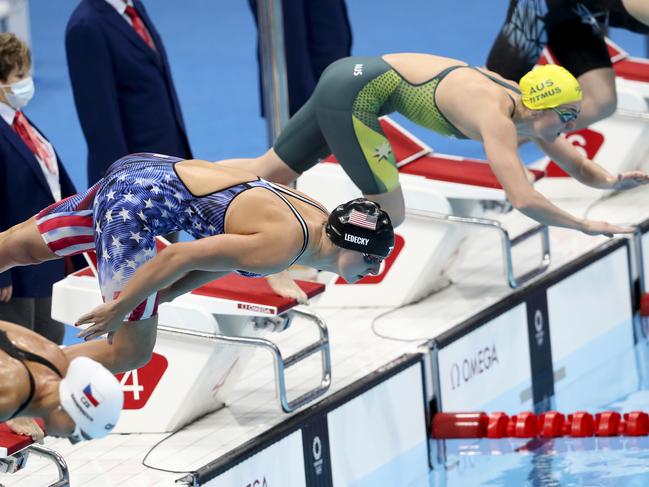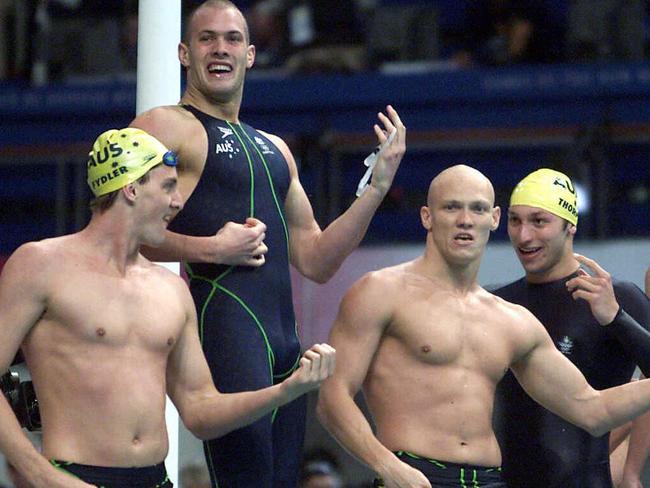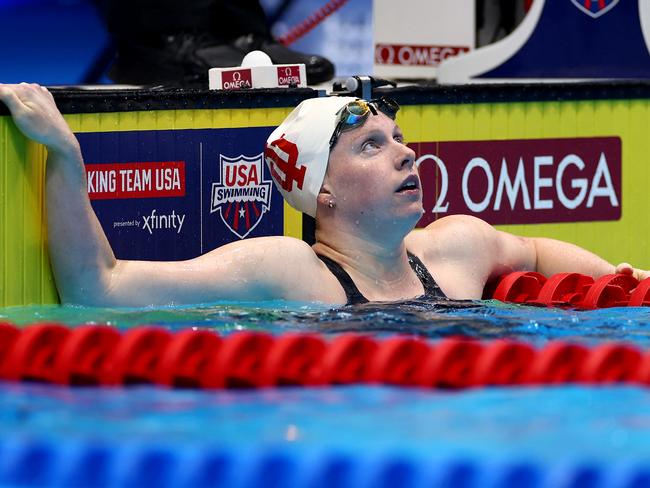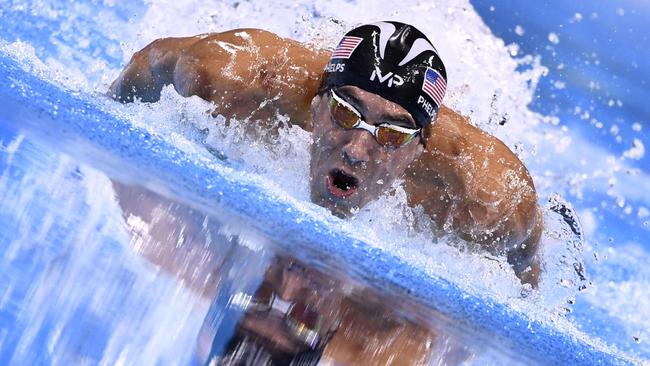Paris 2024: Why this edition of Aussie-US swim rivalry will be so different
Australian sports fans long remember when the Aussie boys smashed the US ‘like guitars’ at Sydney 2000. JULIAN LINDEN looks at what to expect from swimming’s great rivalry when it reignites at Paris.
You can always tell when the American swimming team is under pressure because they suddenly stop yapping about how great they are.
The silence is so sweet but also a little eerie because that’s just not the USA way.
Normal business for the US swim team usually means blowing their own trumpets as loud as they can.
Typically, their shameless boasting is a reflection of the American team’s domination of events in the Olympic pool. For the past nine Olympics in a row, the US has won more medals in swimming than any other country in the world.
In fact, the last time they were beaten for the top spot was in 1988, nearing the end of the Cold War when the East Germans were juicing their competitors to the gills, so it’s no surprise the Americans love to beat their own chests and remind all their rivals why they are No. 1.

But, as Aussie swim fans already know, the Americans are not quite as chirpy when someone gives them a taste of their medicine, which explains why they’ve zipped up less than a month to go before the start of the Paris Olympics.
The clue was the recent US trials, which were meant to send a blunt reminder to the swim world that the Americans still rule the waves. Only, the opposite occurred.
Apart from two world records, the overall results were unspectacular, fuelling speculation this could be the worst US Olympic swim team since the Fall of Communism.
The American team has been in a steady decline since Michael Phelps retired after the 2016 Rio Olympics, capturing just 11 gold medals at the 2021 Tokyo Olympics, their worst return since Barcelona 1992.
At last year’s world championships, the US team plunged to a new low, managing to win just seven golds, compared to Australia’s 13, though they still claimed to have finished on top because they had more overall medals.
A few playful questions from the Aussies would normally have provoked a cheeky response but this time the Americans are keeping their mouths shut, the sure proof they are concerned because historically, the teams have traded barbs without any lingering resentment.
At the Sydney 2000 Olympics, American freestyler Gary Hall’s misplaced arrogance led to one of the greatest moments in Australian sport.

Hall bragged that the US 4x100m freestyle relay would ‘smash the Aussies like guitars’ but his bluster backfired when Thorpe steamed past him on the last lap to break the world record and win the gold medal for Australia.
The underdog Aussie quartet rubbed it in their noses by strumming air guitars on the pool deck as America’s stranglehold on the relay was broken forever and they subsequently lost to the South Africans in 2004 then the French in 2012.
Two decades later, trash-talking American breaststroker Lilly King made an even more outrageous prediction that blew up in her face.
She predicted the US would sweep all 17 gold medals in the women’s swimming competition at Tokyo. The US women ended up with three golds, compared to Australia’s eight.
Asked last week about how the Aussie women were faring before Paris, King was unusually subdued in her response: “I’m not like super focused on the other countries to be honest with you. I look at results, but it’s not going to affect how I’m training.”
American distance legend Katie Ledecky did admit to being impressed by what’s going on in Australia, especially with her great rival Ariarne Titmus.
“I’m a student of the sport. I keep track of everything that’s going on around the world. I know where everyone is going, and I’m excited to race everyone. Ariarne is incredible,” Ledecky said.

US team officials have also chosen their words carefully with the managing director Lindsay Mintenko saying, “obviously the Australians are swimming well. They have for many, many years.”
Just as he was when he was still racing, it was left to Phelps to fire the first shot.
After recently starring in a documentary promoting the rivalry between the US and Australia, Phelps was shown a video of Aussie swim queen Cate Campbell labelling the Americans as sore losers after getting beaten in Fukuoka last year.
“Australia coming out on top of the world is one thing, but it is just so much sweeter beating America,” Campbell said.
“The first night of competition, we did not have to hear Star-Spangled Banner ring out through the stadium. I cannot tell you how happy that made me. Bring on Paris. That’s all I have to say to the US. Stop being sore losers.
“When we’re right next to each other in the warm-up area, the US has this infernal cowbell that they ring, and as someone leaves to go to the competition pool, they ring out ‘U-S-A, U-S-A’ and I have never wanted to punch someone more and steal that cowbell.”

Phelps was visibly agitated when he saw the footage, looking almost as glum as when Ian Thorpe beat him in the 200m freestyle final at the 2004 Athens Olympics.
“I appreciate your comments Cate,” Phelps said “(If) somebody said that to me, I would lose it. I would literally make them eat every word they just said about me.
“Cause people have done it. Chad Le Clos? Thorpe? You guys have all talked sh*t about me and I had the last laugh.
“So for the Americans, if you see what I just saw … I would watch that thing every single day to give me that little extra bit of oomph.”
Campbell’s comments also brought the trash-talking out of King, who said: “It’s just funny to me that it gets on their nerves that much. That’s amusing,” she said
“Is it going to be worse if they beat us than somebody else? Yeah. I’m glad everyone is jealous of the pride that we have for our country.
“We like each other, but we want to kill each other when we’re in the pool.”





